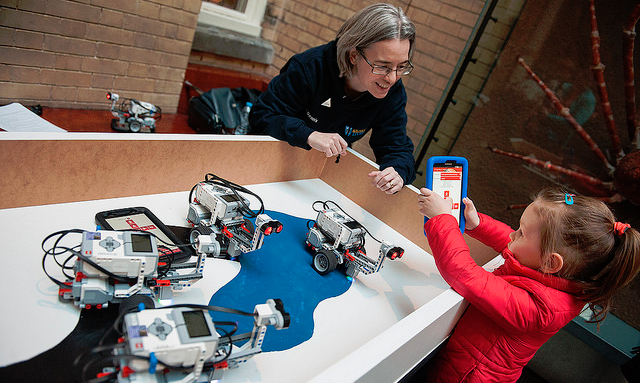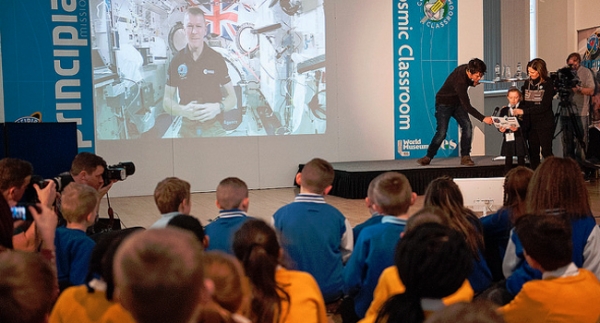"The ISS is certainly no place for a jolly."
With Tim’s launch being the first of a British astronaut in over 20 years, the whole country is understandably excited and keen to follow him on his adventure of a lifetime. But beyond the initial hype and flag waving, what will be the legacy of Tim’s mission and how does having a man on the ISS benefit the rest of us?
Those who watched Tim’s interview with Paxman will know that there is sometimes a perception that astronauts are just floating about in space. While there is a lot of ‘floating’ going on, the ISS is certainly no place for a jolly, with its astronauts working a 40 hour week performing unique science and using a great deal of their spare time on quality outreach that gives young people the chance to get involved in space science and discover just how exciting STEM can be.
About the size of a five bedroom house and orbiting our planet at 27,700 km/h, at a distance of 320 kilometres, the ISS in itself is surely one of man’s most inspirational science endeavours and the perfect tool to capture the imagination of young people all over the world.
In the coming months, Tim will perform science in the unique microgravity environment of this orbiting lab. From materials science to health research and biology, he will work on a variety of experiments, gaining insights that are impossible on the ground.
With Tim now firmly in the spotlight, I hope that more young people will discover some of this exciting science and realise the breadth of opportunity open to those who study STEM. And for those that aren’t interested in your typical STEM routes, there are plenty of outreach projects that can pique their interest. From following Tim’s training regime to growing space seeds, there are many ways UK students can get involved. Most of the school activities have some element of science or technology in them, but they cover a range of inspiring, curriculum-linked activities, covering everything from computer coding and science demonstrations to fitness and nutrition.

Of course, space is not just about the ISS and astronauts; that’s just a small part of the story. Space can also be really useful for those of us grounded here on Earth. Even your nan and family pet can benefit from space technology! Weather forecasting, navigation, global communications and broadcasting all rely on infrastructure in space. It can also provide the tools to manage global challenges such as climate change and natural disasters. Technology developed for space missions has even contributed to medical scanning machines, improved car brakes, fire protective clothing and bed bug detection.
Tim’s Principia mission is an excellent opportunity for us to shout about some of these other uses of space and some the other exciting and cutting-edge space activity taking place right here in our country. From Mars rovers to Earth observation missions and satellite communications, the UK space industry is thriving and playing a major role in our average day, from the moment we get up and watch our favourite morning show on digital TV, to the moment we check the next day’s weather on our mobile phones before curling up in bed.
"This exciting science shows the opportunities open to those who study STEM."
Hopefully, Tim’s mission will use space for education, and education for space. These two equally-important aspects are intimately related, since harnessing space to improve the take-up of STEM subjects for the benefit of the UK economy will have corresponding benefits for the space sector by increasing the potential pool of graduates and technicians. Several reviews and much anecdotal evidence demonstrate that few subjects have as much impact as space to inspire interest in the young. For example, a 2009 survey demonstrated that 9% of children now want to become an astronaut (fourth, after ‘famous footballer’, ‘famous popstar’ and ‘famous actor’), which is up from 4% (ninth) 25 years ago.
For those that are inspired to pursue a career in the UK’s thriving space sector, there are a variety of jobs that utilise a wide range of expertise, from physics and astronomy to geology, management and software design. If you pursue a career in space you might find yourself working on a new satellite or spaceplane, developing technology to map a distant planet or helping to make new discoveries about our Solar System. Or you could be using satellites to study pollution on Earth or helping aid agencies reach a disaster zone. The possibilities are as vast as space itself.
I hope teachers across the UK will join us in celebrating Tim’s mission by getting their schools involved in some of the exciting events and activities available.
Do you bring space travel into your school? Let us know in the comments!


















